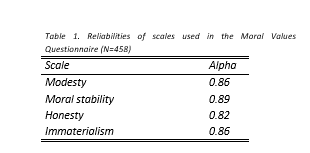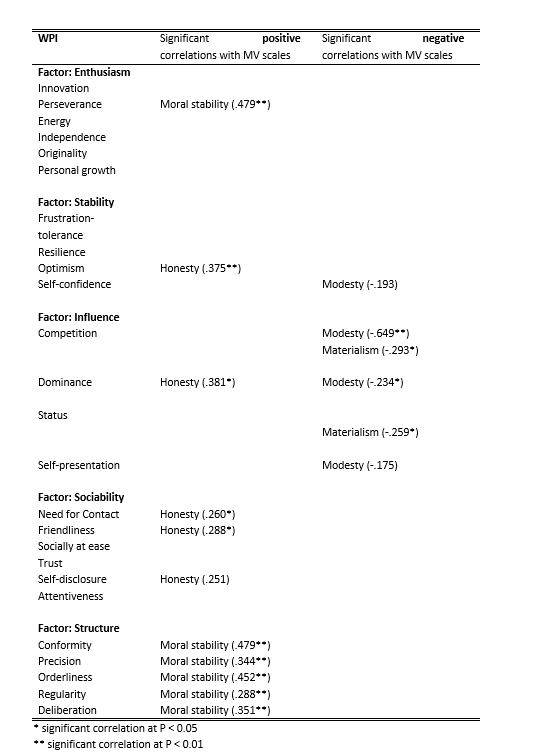Factsheet Moral Values
Just as intelligence tests, integrity tests are a good predictor of work performance (Bloemers & van der Molen, 2004).
Description
Persons of integrity act in accordance with their beliefs and promises. The Moral Values Questionnaire can, in a relatively short time of 15-20 minutes, sketch a picture of the chance that a person will exhibit moral behaviour. This says something about a person's integrity. The Moral Values Questionnaire sketches a picture of several scales related to moral behaviour: Modesty, Honesty, Moral stability, Materialism.
Development
In developing this questionnaire, use was made of the Honesty-Humility factor of the HEXACO personality questionnaire, which has been shown to be a good predictor of work performance (Van der Heijden, 2009) and is based on four core concepts: Modesty, Honesty, Moral stability and Materialism. There have been several earlier versions of this Moral Values questionnaire. Researchers have sought which questions functioned best, modifying or deleting questions in the process. The structure of the questionnaire has also been improved after factor analysis. The current Moral Values Questionnaire consists of 56 questions. For each question, candidates are asked to indicate to what extent the proposition applies to them. See also Figure 1.
Figure 1. Sample question from the Moral Values questionnaire
Reliability
The reliability of a questionnaire indicates the instrument’s accuracy, which relates to the reproducibility of the measured outcomes. The reliability of the (general) factor score was calculated using the formula for the stratified alpha (see Nunally, 1978, p. 248). With an outcome of .94, this reliability was very high. Generalisability was calculated with the alpha formula, though based on scale scores rather than the items (see Snijders, Tellegen & Laros, 1988). The generalisability rating indicates the expected correlation with a factor score based on a different, equally large sample of scale scores from the same domain as the factor in question. With a rating of .79, the generalisability of the questionnaire is considered sufficient.

Table 1 shows the reliabilities of the four scales. These are, according to COTAN (2009) guidelines, sufficient to good, which means that the questionnaire is reliable enough to be used for recruitment purposes.
Validity
Test validity gives an indication of the extent to which the instrument actually measures what it intends to measure. In the case of the Moral Values Questionnaire: does the questionnaire actually test a person’s moral values. To determine the validity of the Moral Values Questionnaire, the internal validity of the test itself must be examined first. Another way to determine the validity of a test is to compare it with other tests, serving as the criterion. To this end, a study was conducted to test the external validity of the Moral Value Questionnaire.
Internal validity
In order to determine the general internal structure of the questionnaire, several analyses, including factor analyses, were carried out to provide evidence of the internal validity of the questionnaire. The questionnaire is structured in accordance with the structure of Moral Values found in literature, based on a general (main) factor and several subordinated scales for the purpose of differentiation. For a more detailed description of this analysis, please refer to the Addendum to the Moral Values Guide.
External validity
In order to say something about external validity of the Moral Values Questionnaire, it was compared with the Workrelated Personality Inventory (WPI) in a study. The correlation between the two tests is shown in Table 2.

The scales of the Moral Values Questionnaire have explainable correlations with the scales of the WPI. For example, there is a negative correlation between the Modesty scale and scales that say something about a person’s tendency to exert Influence, with modest people scoring lower on Influence scales. In addition, it is clear that there is a positive correlation between the Moral stability scale and scales that say something about a person’s tendency to apply structure. People who score higher on Precision and Conformity also have greater Moral stability. It can also be seen that people with high scores on Materialism have lower scores on scales that say something about wanting to win (Competition) and valuing prestige (Status). Finally, it appears that people with a higher score on Honesty also score higher on the Sociability factor. People who are more sincere will also tend to be more kind and caring and have better social skills. For a more detailed explanation of the, please refer to the Moral Values Guide.
The results regarding the correlation between the scales used in the WPI and the Moral Value Questionnaire show that several scales are correlated, contributing to the external validity of the questionnaire.
Norm group
The Moral Value Questionnaire has a selection norm group (N = 458) that has been weighted to be representative of the Dutch labour force (CBS data for 2018). The norm group took the test in a selection setting. For a full description of the norm group, please refer to the Addendum to the Moral Values Guide.
Application
This questionnaire can be used to learn more about a person’s moral values. The questionnaire can be completed by all members of the Dutch labour force. In recruitment settings, this questionnaire will give an indication of the extent to which the applicant will exhibit integrity and the resulting report can serve as a guide for the personal interview.
References
Bloemers, W., & Molen, H. van der (2004). Het (genegeerde) belang van intelligentie voor arbeidsprestaties. Opleiding & Ontwikkeling, May 2004, 3-9.
Nunnally J. C. (1978). Psychometric Theory. USA: McGraw-Hill, inc.
Cutters, J. Th., Tellegen, P. J., & Laros, J. A. (1988). S.O.N.-R 5½-17 Verantwoording en Handleiding. Groningen: Wolters-Noordhoff BV.

